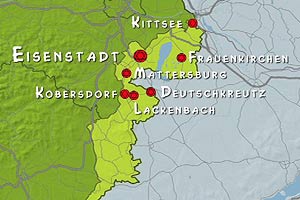
The “Seven Communities” or “Sheva Kehillos” in Vienna Burgenland are seven Jewish communities that were founded in the 18th century. They were founded by Jewish refugees from Hungary and Slovakia who were fleeing religious persecution. The communities are:
1. Kittsee: The community of Kittsee was founded in 1712 and was one of the first communities in the region. It had a significant Jewish population and a flourishing Jewish culture.
2. Frauenkirchen: The community of Frauenkirchen was founded in 1712 and was known for its synagogue and Jewish school. The community had a thriving Jewish community.
3. Mattersburg: The community of Mattersburg was founded in 1712 and was an important Jewish community in the region. It had a synagogue, a Jewish school and a mikvah (ritual bath).
4. Eisenstadt: The community of Eisenstadt was founded in 1717 and was the center of the Jewish communities in Vienna Burgenland. It was known for its magnificent synagogue, the Esterházy Synagogue, and for its important Jewish culture.
5. Kobersdorf: The community of Kobersdorf was founded in 1726 and had a small but lively Jewish community. It had a synagogue and a Jewish school.
6. Lackenbach: The community of Lackenbach was founded in 1730 and had a small Jewish community. It had a synagogue and a Jewish school.
7. Deutschkreutz: The community of Deutschkreutz was founded in 1737 and had a significant Jewish community. It had a synagogue, a Jewish school and a mikvah.
These seven communities played an important role in the Jewish history of Vienna Burgenland. They were centers of Jewish religious and cultural life and contributed to the diversity and cultural enrichment of the region.
The seven communities in Vienna Burgenland, also known as Sheva Kehillos, not only had an important Jewish history, but were also closely linked to viticulture. Viticulture played an important role in the economic and cultural development of these communities.
The region's fertile soils and favorable climate provided ideal conditions for viticulture. The Jewish communities in Vienna Burgenland were instrumental in the development and promotion of viticulture. Many Jewish families were winegrowers and ran their own vineyards.
Viticulture was not only an economic activity, but also an integral part of Jewish culture and religion. Wine played an important role in religious ceremonies and celebrations, especially during the Sabbath and Jewish holidays. The Jewish communities in Vienna Burgenland were proud of their wine tradition and cultivated it carefully.
Viticulture also contributed to the cultural diversity and enrichment of the region. The Jewish winegrowers contributed their knowledge and experience to viticulture and contributed to the further development of wine production techniques. The wines from the Viennese Burgenland gained a good reputation and were appreciated both regionally and nationally.
Today, viticulture is still an important economic sector in the region. The tradition and heritage of Jewish winegrowers continues to be cultivated and contributes to the identity and attractiveness of the seven communities in Vienna Burgenland. Viticulture is a symbol of the close connection between Jewish history, culture and the landscape of this region.
